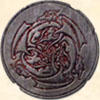Diviner
A specialist in the school of Divination. Diviners are perhaps the wisest of all wizards. Their investigations into the world around them and their perusal of events of the past and the future empower them with a base of knowledge and insight rivaled only by the most learned scholars. A diviner typically possesses a striking insight into the workings of men's minds; few are better judges of character than diviners.
Diviners are not predisposed to the adventuring life, and accept such a career only reluctantly. They are not natural combatants; in fact, wizards lacking in physical prowess are drawn to divination more than any other specialty. Still, diviners make valuable additions to adventuring parties; their judgement, cunning, and plain common sense are welcome commodities. A party must take care to provide protection for diviners since they usually lack any significant ability to defend themselves.
Diviners are loners at heart and do not make close friends easily. They rarely raise large families. Diviners of good alignment generally harbor no ill feelings against other people, and will usually assist them when asked. Still, they prefer to live alone in remote areas where they can conduct their research and investigation undisturbed. Stone towers on cliff sides or atop high hills are ideal residences for diviners. Though they show little interest in material possessions, diviners earn money by charging for their services as seers, fortune-tellers, and finders of lost objects and persons
Allowed Races: Elves, half-elves, and humans are all eligible to specialize as diviners.
Ability Requirements: A wizard must have a strong intuition and exceptional willpower to master divination spells, reflected in a high Wisdom score. Specialists in this school must have a minimum Wisdom score of 16.
Saving Throw Modifiers: All opponents modify their saving throws by -1 when attempting to save against a divination spell cast by a diviner. A diviner adds a +1 bonus when saving against divination spells or any magical devices that duplicate these effects.
Bonus Spells and Acquired Powers: A diviner can memorize an extra spell at each spell level, providing that at least one of the memorized spells is from the school of divination.
When a diviner reaches 17th level, he acquires immunity to all forms of scrying spells, such as ESP and know alignment, as well as immunity against magical items that duplicate these effects. An opponent using ESP on a 17th level diviner has no more success than if he were attempting to read the mind of a stone. An opponent using clairaudience on an unseen 17th level diviner neither receives information nor becomes aware of the diviner's presence.
When a diviner reaches 19th level, he receives the ability to cast a special find traps spell three times per day. The spell has an area of effect equal to a 10-foot-path up to a range of 30 yards. To cast the spell, the diviner must merely point in the desired direction and concentrate; no verbal or material components are required. Similar to the 2nd-level priest spell, find traps reveals the existence of all normally concealed magical and mechanical traps, including alarms, glyphs, and similar spells and devices. The diviner learns the general nature of the trap (magical or mechanical) but not its exact effect or how to disarm it.
When a diviner reaches 20th level, he receives the ability to cast a special divination spell once per day. To cast the spell, the diviner must concentrate for one full turn; no verbal or material components are required. Similar to the 4th-level priest spell, divination reveals a useful piece of advice concerning a specific goal, event, or activity that will occur within the next seven days. The revelation may take the form of an omen, a short phrase, or a cryptic verse, but it always reveals specific advice. In all cases, the DM controls the type of information revealed and whether additional divinations will supply additional information. The base chance for a correct divination is 80 percent, adjusted by the DM for unusual circumstances or extreme requests (such as a diviner trying to learn the exact location of a powerful artifact). If the dice roll fails, the diviner knows that the spell failed, unless specific magic yielding false information is at work.
Oppositional Schools: The diviner is denied access to the schools of conjuration / summoning.
Ethos:Diviners tend to be cautious and deliberate in their actions. Because their divinations have taught them that men are prone to hiding their true feelings and motivations, many diviners are suspicious and distrustful, sometimes to the point of cynicism. Those diviners who allow distrust and cynicism to overwhelm them tend to be of evil alignment. Those who accept man's ambiguous character as a part of the natural order tend to be of neutral alignment. Those who maintain faith in man's innate goodness tend to be of good alignment.
